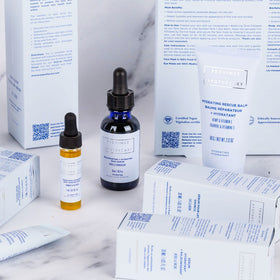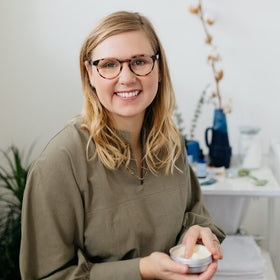Go Plastic-Free | 5 Steps To Ditch Plastic

Now more than ever single-use plastic is everywhere we look. Over the last ten years, we have produced more plastic than during the whole of the last century, and 50% of that plastic is single-use like straws, plastic bags and coffee cup lids. It can be pretty intimidating to see how much we rely on this stuff for our everyday convenience but we must pay attention, for our future, our environment, and our health. Here are some ways our wastefulness has impacted our planet:
- The average American throws away approximately 185 pounds of plastic per year.
- Canadians buy about 2.4 billion litres of bottled water a year, about 68 litres per person.
- It takes 500-1,000 years for plastic to degrade.
- As these plastics break down into microscopic fragments in our oceans, they are eaten and absorbed by the wild fish and sea animals that rely on the oceans. The accumulation of this plastic is then transferred to us via the fish and seafood we eat.
- Plastic chemicals can be leached from the plastic and absorbed into our food and by the body. Some of these compounds found in plastic have been found to alter hormones or have other potential human health effects.
- It has been suggested there could be at least half-a-million pieces of plastic per square kilometre in some parts of the Great Lakes, equivalent to 2,500 pieces of plastic per area the size of a football field.

Here are some ways we can reduce our plastic pollution and protect our health:
1. Buy in bulk
Bring your own reusable glass jars and buy in bulk. Many bulk and health food stores have a reusable container program that allows you to cut down on plastic waste. It also allows you to buy just as much as you need saving on food wastes and money!2. Bring your own cup
I totally understand loving getting a cup of coffee on the go from a local cafe in the morning but it’s not worth sacrificing our planet. Find a reusable mug you love or a mason jar from home and bring it with you! I love S’well and Corkcicle cups that keep your coffee warm too! Finding one with a lid that is easily sealable is great to double as a water bottle in a pinch too!3. Avoid bottled water
Bottled water requires so much energy, oil, and water to make, the plastic itself uses 4 times the amount of water to produce one plastic bottle than the water that actually goes into the bottle. The thin plastic that is used to make these bottles is very sensitive to sun exposure and can leach xenoestrogens into the water. These mimic the hormones in our body and can lead to lots of issues, especially for women! Best to avoid these bottles and either use your reusable mug (from tip 2) or pick up a reusable bottle too!4. Pack a lunch box
Whether you are eating on the go or preparing your lunch from scratch, packing a small lunch kit with you helps to reduce your waste! I carry a fork and spoon with me wrapped in a cotton napkin in my purse, that way I never have to rely on the single-use cutlery offered at most takeout spots. Bringing your own glass container is also a great way to pack up leftovers too!5. Avoid applicators
Close to 20 billion sanitary napkins, tampons, and applicators are dumped into North American landfills every year. These can take thousands of years to degrade. A simple way to change that is to switch to tampons without applicators to decrease a lot of unnecessary waste. Menstrual cups like a these or leakproof menstrual panties like these are a great way to reduce waste even further and avoid the chemicals found in tampons and pads too!
While some of these steps might seem pricey and a strain on your budget, they actually will save you money over time. Many coffee shops offer a discount for bringing your own cup, shopping in bulk is more economical, and reusable menstrual products are a one-time purchase.
Avoiding plastics can seem daunting but starting with these 5 tips can help raise awareness and help minimize our dependence on single-use plastics for our health and for the environment!
xo Fran
Additional Resources:
www.ecowatch.com/22-facts-about-plastic-pollution-and-10-things-we-can-do-about-it
www.cleansthenewblack.com/health/plastic-hormone-imbalance



